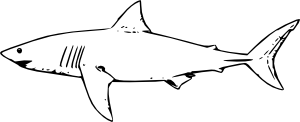“Stifling,” said the papers. “Heat Wave Worst in Recorded History!” At least The War was over. But we had to have something to worry about. Commies. They were everywhere in government and standing alongside you at the DairyFreez, at the tire company, at Chick Shay’s Auto Sales. They looked like anyone else. Except for the ones they caught—they looked evil in the newspaper photos. McCarthy told us what to look for on black and white TV.
Sharks were eating people in New York and California; they were even swimming up the fresh water creeks and tributaries, hunting for children swimming, cows standing in the cooling waters. “Shark Attacks on the Rise in New Jersey!” If they could get down the creeks, maybe they could get to Kansas City. The Missouri River was huge.
Sharks and communists and polio. My Daisy Red Ryder BB gun was not much against these but I kept it by my bed anyway. It would make a commie think twice.
In the humid, steaming midwest we went to movies. “Air Cooled!” Who cared what the movie was, a couple of hours relief was worth the admission. We kept the big house dark and shaded in the daytime, fans buzzing. We drank iced tea and lemonade until we were burping it. We played in the lawn sprinklers, even though it was little kid stuff, and adults fanned themselves with cardboard and magazines and said “Hoo,” pulled at their sodden shirts, flapping them, standing in front of fans.
The day before Marguerite O’Reilly disappeared, I dried off inside with a towel, and put on a t-shirt and jeans. My aunt Mick was going to walk us up to the DairyFreez, get us cones and a pint of handpacked vanilla for dessert that night. We’d seen “Dead Reckoning” twice at The Strand, mainly for the cool air. We were becoming bored. We liked walking with aunt Mick. She was a lot like us kids, and passing cars would wolf-whistle at her. It kind of made me proud walking with someone who got whistled at.
Then Marguerite O’Reilly went missing. The last time I’d talked to her she’d run home shrieking. I’d overheard her talking to another kid about a piece of glass in her heel. “I can feel it when I walk,” she’d said. I’d pulled my Boy Scout knife and said, “Gimme it. I’ll dig it out with this.” I’d thought she was talking about the heel of her saddle shoe. It was her actual heel, she’d meant, and there I was waving a knife around. I was twelve, she was fourteen, so there was a chasm between us. And breasts. She had them. And a way about her that made me watch. She got whistled at, too.
The police came to her house. We all watched from bushes. They walked around the house looking for clues, fanned themselves with their hats and drove away. The house looked sad, windows like eyes. I dug out my Crimestopper notebook and looked up kidnapping but couldn’t find much. Then Dickie Bender and I peered into her basement windows, hands cupped around our eyes. Nothing there that we could see but we felt she could be buried there. She had been a “problem” to her parents.
I wrote notes about the police visit, exact times, watched for suspicious people in the neighborhood. We found several and followed them to their homes, watched their comings and goings. They could be communists, or kidnappers or both. “Maybe sharks got her,” said Dickie. But he was ten.
I eavesdropped on dark talk around the kitchen table at night. My dad said it was probably sexual. My aunt and grandmother shushed him. Dickie and I listened to my dad’s shortwave radio for any clues but the Portuguese and the Spanish were no help. Not that we could understand. Dickie said he thought he heard her name.
The next day Dickie told me he’d overheard his folks say that Marguerite had run off with her cousin, a country western singer, and they’d got married in some hick town. It wasn’t in the papers that we could find. More sharks though. Sharks everywhere, maybe closer to KC now. And my folks let me off the short leash they’d applied when Marguerite went missing. It was still hot, And now it was boring again. But Dickie said he thought maybe his folks were communists. So we hid behind furniture and wrote down things they said.
His dad said, “It’s hotter than a four-balled tomcat.” His mom said “Herb!” and he said back, “Well, shoot.” I wrote it down. And a lot more that I was learning that summer. When a carload whistled at aunt Mick, she put her thumb to her nose and waggled her fingers. I asked her what does that mean, and she said, “It means kiss my ass.” That made my ears red, but not as red as when the car backed up and the driver said, “Lady, I’ll kiss your ass till it’s white as a soda cracker.” Then he burned rubber and Aunt Mick laughed, so I did too.
